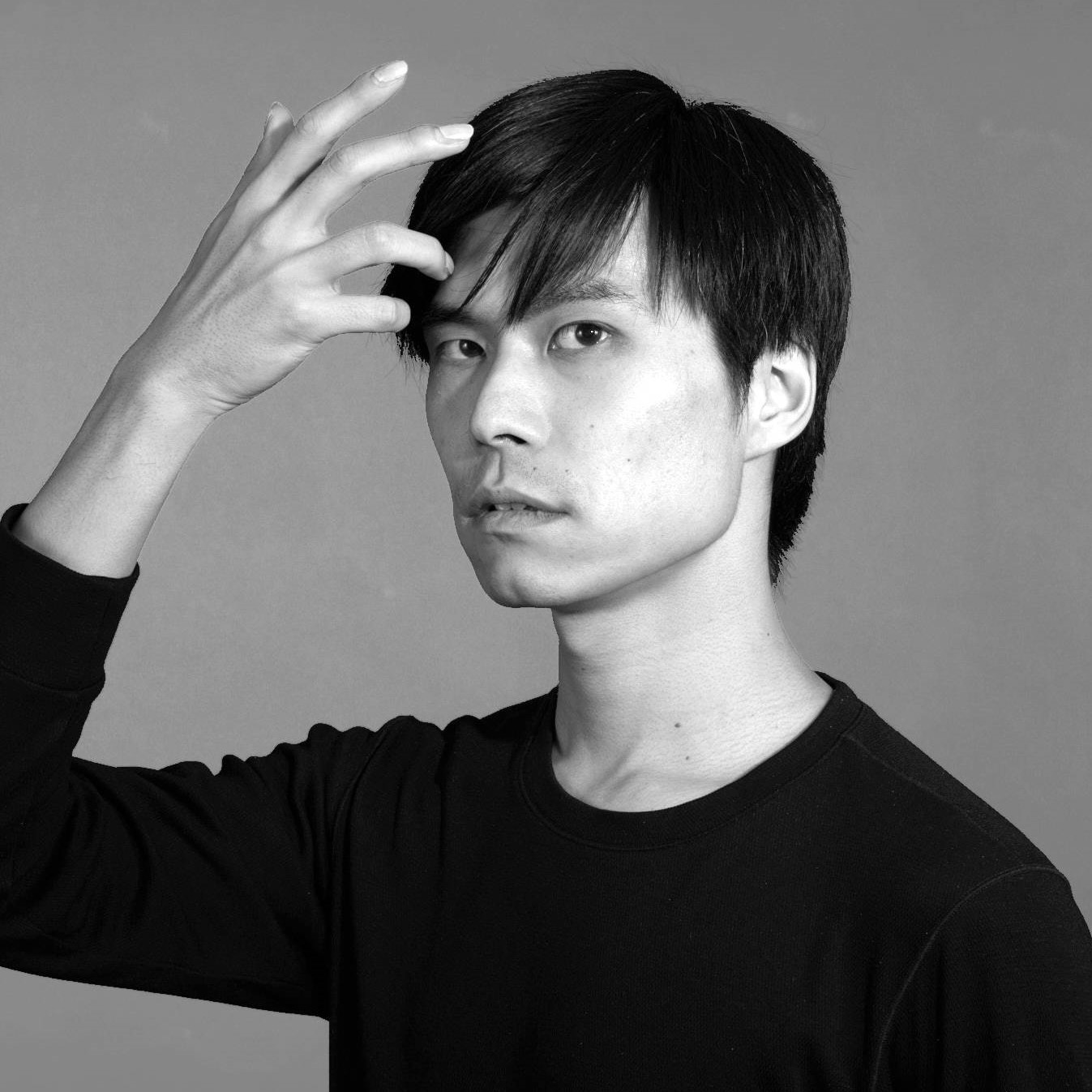Processing Community Day Tokyo 2020
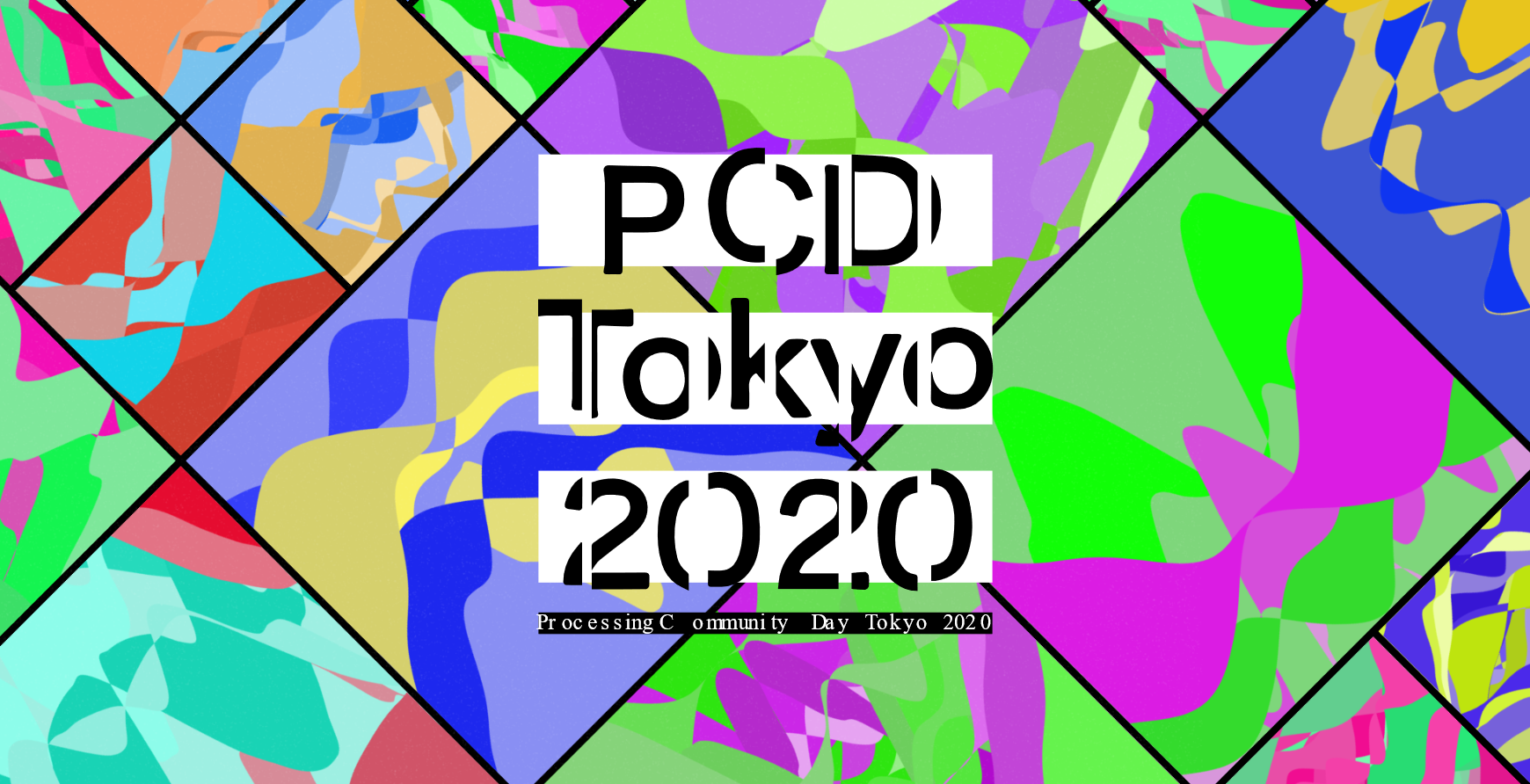
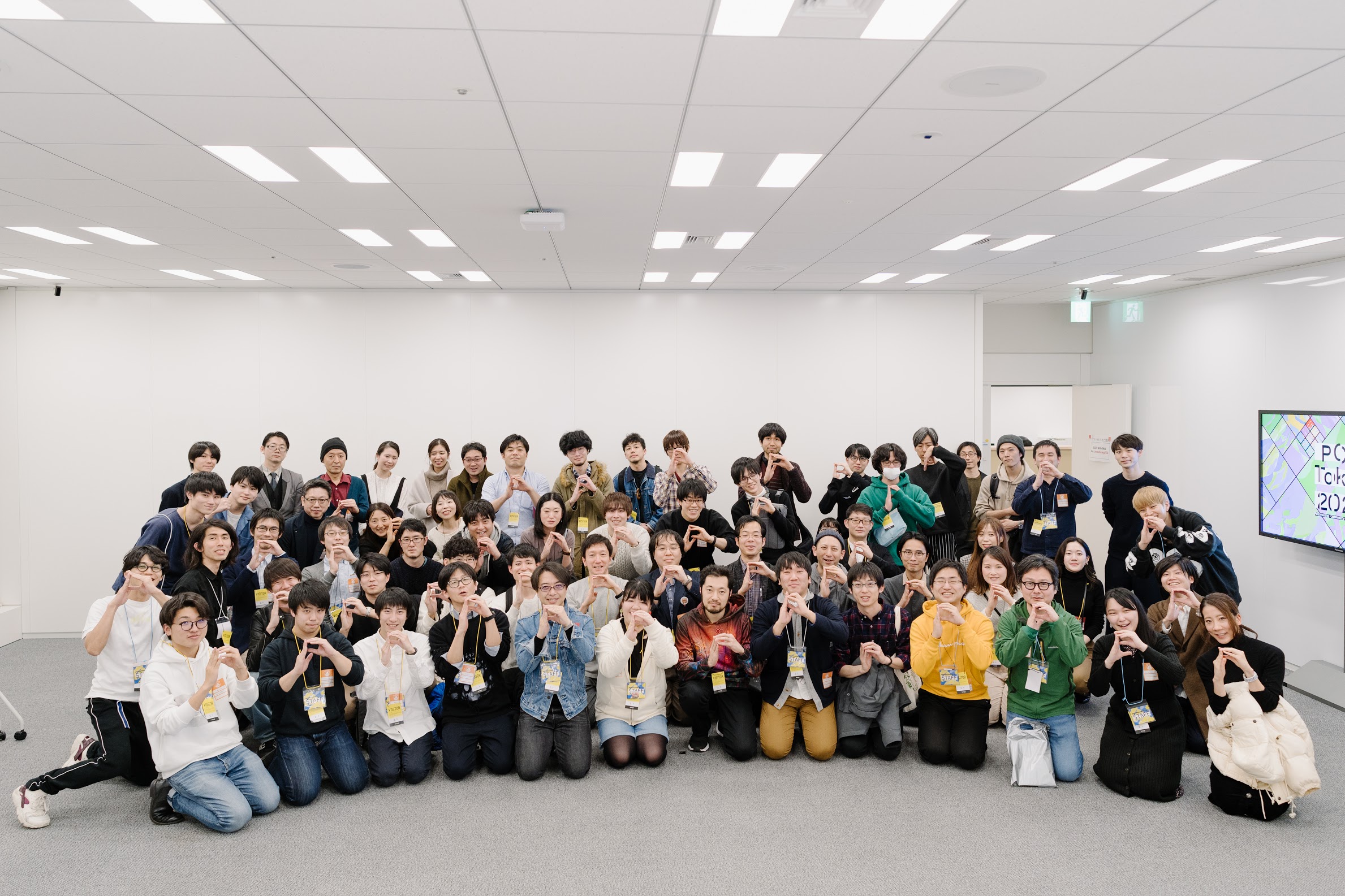 group photo of PCD Tokyo 2020
group photo of PCD Tokyo 2020
The second Processing Community Day Tokyo (PCD Tokyo) was held on Feb 1, 2020 at Yahoo! LODGE in Tokyo.
I founded the first PCD Tokyo with Ayumu Nagamatsu and Yasuto Nakanishi. This time, although I could not participate as I am currently based in Germany, we had more than 10 new organizing members and I helped the organization remotely. Therefore, this report focuses on the organizational aspect.
Though we started planning PCD 2019 in October 2018, this time we started a bit later, in November. We had the first meeting at Yahoo! LODGE, where is also the event venue, and as the team grew, I did remote meetings with those who could not make it to the real-life meeting. For PCD 2019, we naturally distributed tasks as it was run by 3 of us, but since the team became bigger, we needed to assign tasks explicitly. I interviewed all the members and formed a few groups based on their strength: mainly, communication with the venue, lightning talk, workshop and design. In the first meeting of each group, I attended remotely to give specific tasks as people can easily get lost if I do not give concrete ideas. Also, I assigned a person responsible for scheduling meetings to make meetings run smoothly. I did not assign a group leader so that there is no hierarchy in the organization. If someone needs to communicate with another group, I introduce the member responsible for that specific task - so the organization worked like a node-based network. Since most of the meetings were schedule in the evening in Japan, I had to join meetings soon after I wake up in Germany. It was a lot of involvement for me especially in November and December, which I think was an initial investment, and in January the groups became more autonomous and I only had to answer questions on Slack, to throw some reminders, and to proofread text for announcements. In addition, I am in touch with Processing Foundation in the US for further collaborations with other PCD chapters.
次回のPCD Tokyoに向けたキックオフが昨日おこなわれました!運営メンバーに様々な方が加わりパワーアップしました。 pic.twitter.com/ADhmHSPIuv
— PCD @ Tokyo (@PCD_Tokyo) November 30, 2019
A photo of PCD Tokyo kickoff meeting that I joined remotely
Since I curated and organized the lighting talks (LT) in 2019, I worked closely with takawo and Reona, who were in the LT group. Takawo presented at the last LT, and Reona led a beginner workshop in Processing. They agreed with our vision of PCD Tokyo and joined the team While continuing their commitments in 2020 as presenters. Although we called it LT group, in 2020, we added a talk session, a live-coding session and a “consultation room” where we collected a few questions regarding technical things and career.
The day started with 2 keynote sessions by Satoru Sugihara and Akihiko Matsumoto. Although they have different expertise, architecture and music, there is an intersection - algorithm - in their practices.
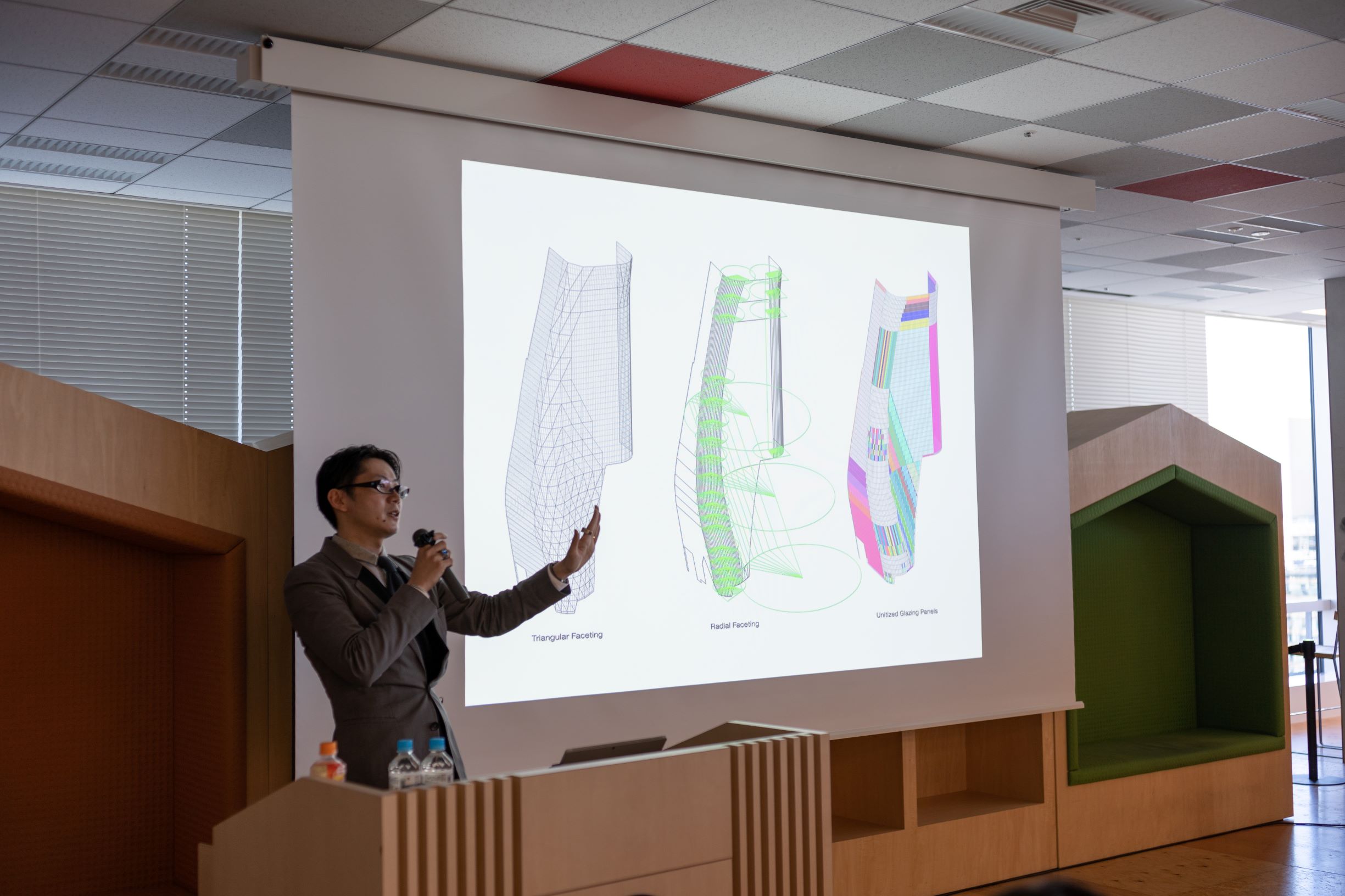 Keynote by Satoru Sugihara
Keynote by Satoru Sugihara
In the LT session, there were various topics from programmers and artists. Ayumu Nagamatsu is a core member of PCD Tokyo, and he presented how he became a creative-code freelancer. I respect him a lot as he is active as an artist and a freelancer, and he is from the same generation as me; moreover, we are the founding members of PCD Tokyo. Hina Nakamura created an installation for her gratudation project that uses Processing and Arduino for painting. Not only technical details but she explained the concepts behind the piece. Naoki Yasuda presented programming for third-person shooter games. What I was impressed was that he made browser-based slides that runs p5.js sketches on it. Taito Otani presented his workflow of using p5.js inside Max4Live for not only audio-reactive visuals but also physics simulation that triggers synthesizers in Ableton Live. @moxus is an artist known for live-coding, and he introduced his WebGL-based tool Kusabi. I agreed with his words, “do not make hidden techniques only for mastery.” Mayuko Kudo is a friend of mine from the same school in Cologne, and she presented an installation to poke a Japanese traditional sliding door covered with thin paper, among her works about augmented reality and projection mapping. She also talked about future ideas, such as projecting aquarium on a garbage collection point, and I am curious about her next works.
.@moxus さんの言う「再利用可能性が低いツール」ってすごく面白い視点.ORCAやTidalCyclesのようなライブコーディング的な視点からのプログラミング言語と言う感じがする😃 #PCD2020 pic.twitter.com/4i1k8IMOfl
— ǝʞnsunɥs oʍɐʞɐʇ (@takawo) February 1, 2020
moxus presenting Kusabi
The second half started with a talk session about daily coding, moderated by takawo with presentors Hau-kun, nasana and Almina. They presented their approach to daily coding, which is an idea to produce and to upload sketches every day, followed by a discussion about how to continue this habit. Since I have been following their online discussion led by takawo to prepare for the event, I am happy that they had a constructive discussion and they inspired the audience.
ドイツからの質問笑#PCD2020 pic.twitter.com/apCO8CXGKo
— nas.iron.otas (@no_ri_san) February 1, 2020
At the talk session, I posted a question “how many hours they spend for daily coding” from Germany and they answered that each of them spend roughly one to two hours.
Niinomi launched his online platform NEORT at the last PCD, and he made a followup talk this time. Not only he organized the exhibition at PCD 2020, he joined the organization team for planning other logistics.
私のやんけ!!!#PCD2020 pic.twitter.com/aTTx1QusPS
— レオナ (@reona396) February 1, 2020
Exhibition at PCD Tokyo 2020
The last session was live-coding performances from 3 groups. Yosuke Hayashi from Haus is developing a live-coding sound instrument p-code, and they performed with a chat platform that audience can join to write p-code snippets and to play together. I have already seen the project when Akihiro Kubota presented it to us, and since then I have been making a p-code clone, so I am glad to see the performance. Atsushi Tadokoro is one of the well-known live-coder, and he performed a short-version of 100 Fragments using TidalCycles and GLSL shaders. I have seen his work in Tokyo and Berlin already, and since we planned the live-code session for PCD, he was the first person to came to my mind. I am glad that he kindly accepted to perform as well as to give a workshop about ml5.js on the same day. Shihpin the Livecoder also used TidalCycles to perform, overcoming technical issues. He coded polished techno sound and we should definitely follow his works as he also performs visual live-coding using Hydra.
ライブコーディングカオス #PCD2020 pic.twitter.com/7ffhznUERX
— maope / mao tada (@t_mao_p) February 1, 2020
Performance by Haus and the audience using p-code
田所先生によるライブコーディングが始まりました。SuperColliderからの音抜けめっちゃいい👍#PCD2020 pic.twitter.com/o2UM5Pthia
— Taito Otani 😎 大谷泰斗 (@taito_otani) February 1, 2020
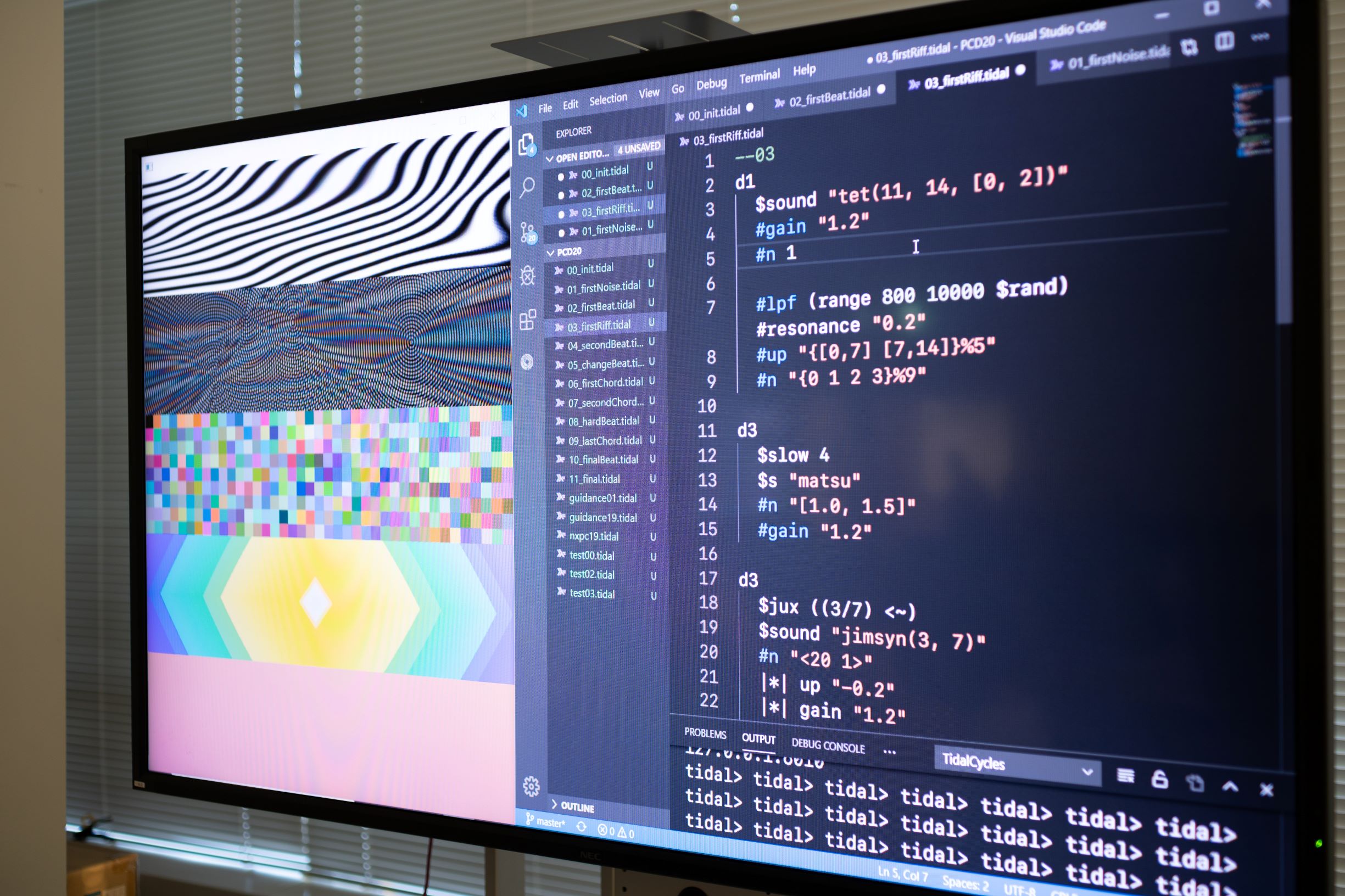 100 Fragments by Atsushi Tadokoro
100 Fragments by Atsushi Tadokoro
初めてライブコーディングを見たけど、超カッコよかった。攻殻機動隊のオープニングみたいに文字がバーっと打たれていくのって単純にカッコいい。#PCD2020 pic.twitter.com/9wfYo0yq9a
— chonsolitia (@chonsolitia) February 1, 2020
Performance by Shihpin the Livecoder
We organized various workshops including one for teenagers, one for beginners, sound, math, GLSL, gaming and machine learning, which all had positive feedback.
午前のワークショップが終わりました!
— nas.iron.otas (@no_ri_san) February 1, 2020
下は小3、上は中2まで、ワイワイと♪TAは男女4名の小学4年生!大活躍!!
これでみんなはスマホアプリの開発者だ!!#PCD2020 pic.twitter.com/LFDlL8OUIQ
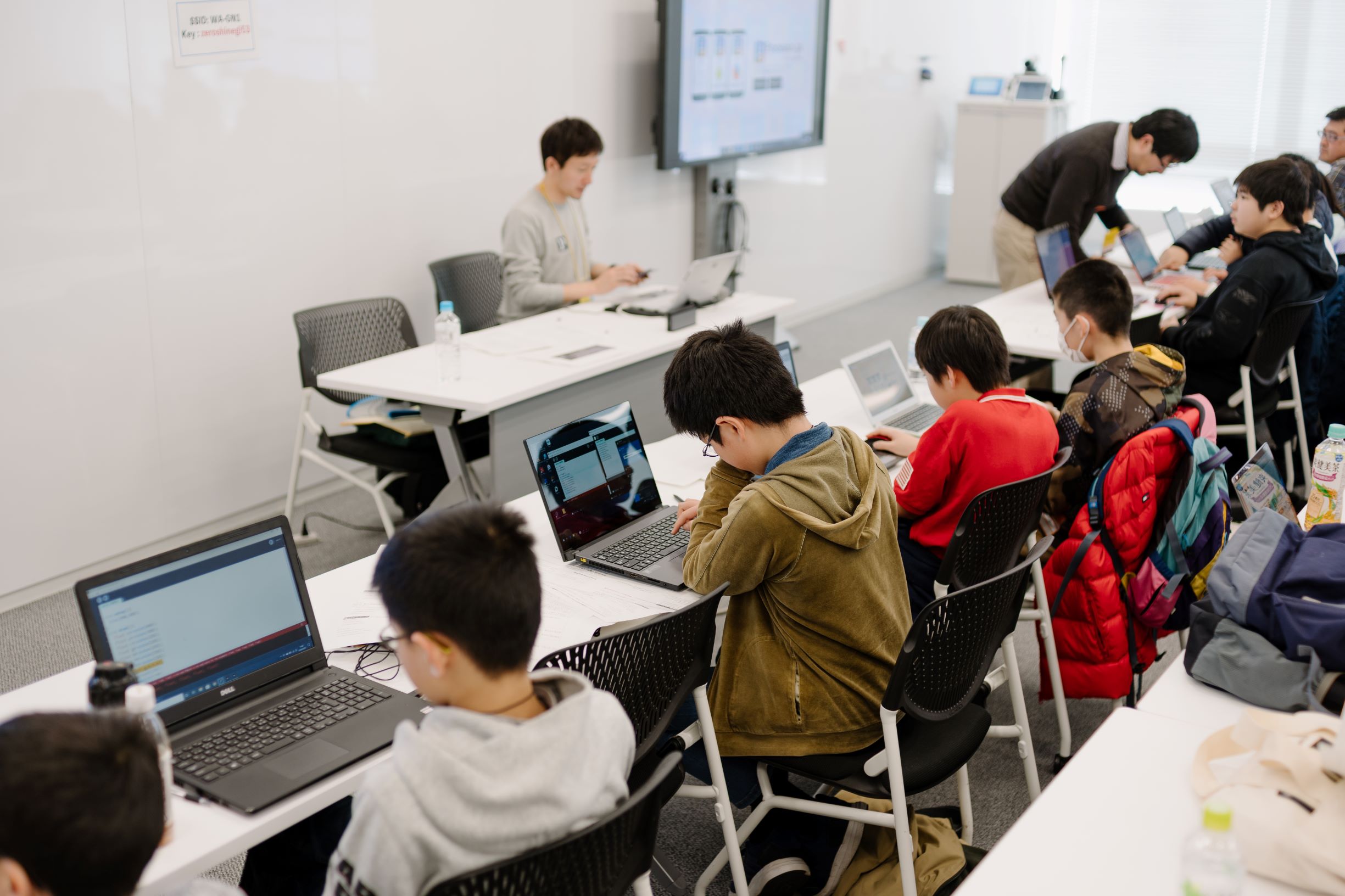 A teenager workshop led by Nori-san
A teenager workshop led by Nori-san
Processing Community Day Tokyo 2020で巴山先生のワークショップに参加。
— mo da ki (@moda_ki) February 1, 2020
配られた紙を使い手を動かしながら理解する進め方がすごく分かりやすかったです。先生の著書『数学から創るジェネラティブアート』の補完を超える内容で受けて良かったです。https://t.co/FzuK1eIoov#Processing #PCD2020 pic.twitter.com/olHe5DDeFA
Tatsuki Hayama explained math using origami.
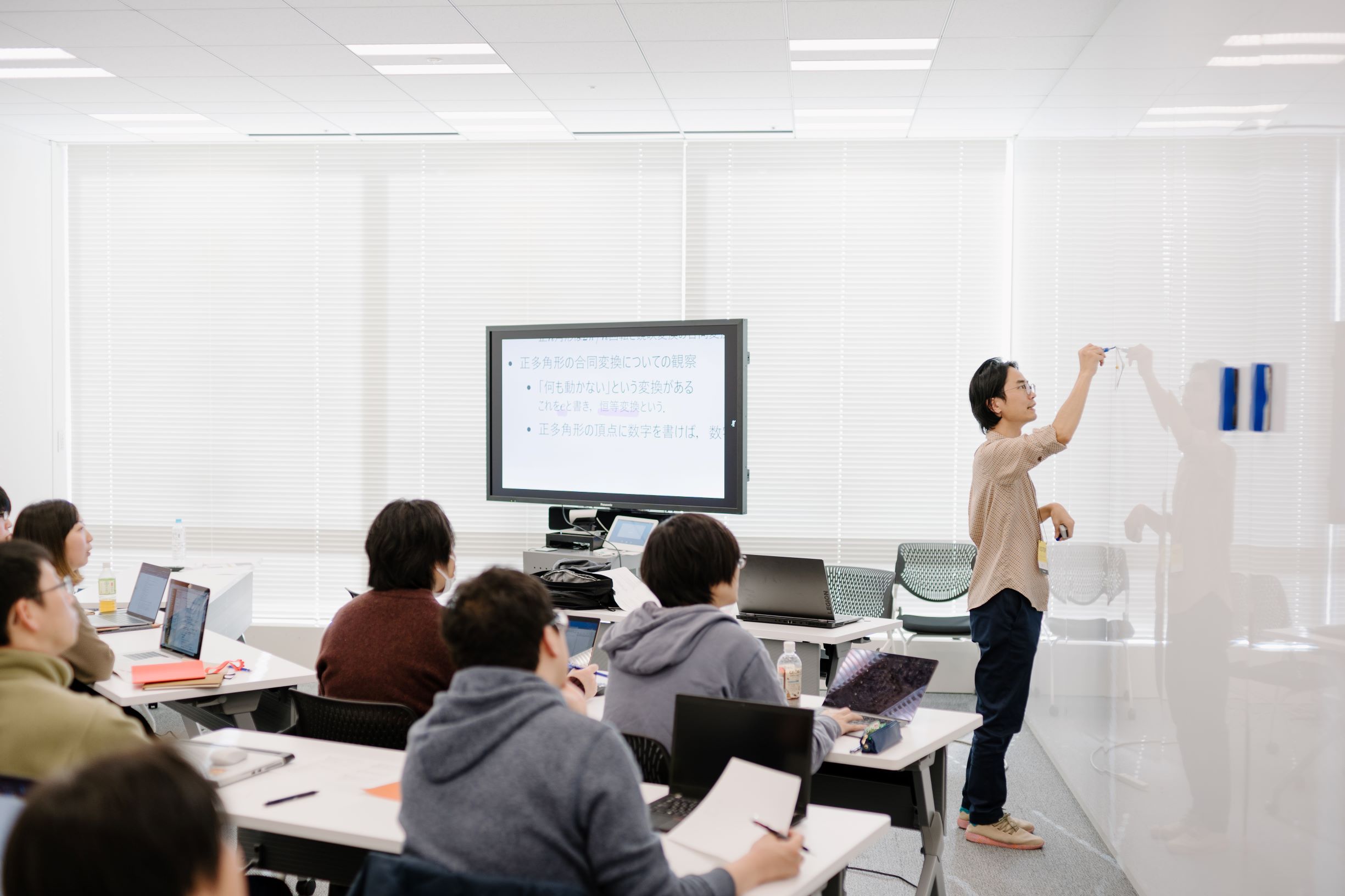 Another photo from the workshop by Tatsuki Hayama
Another photo from the workshop by Tatsuki Hayama
音と連動するProcessing! (gif動画は無音) #PCD2020 pic.twitter.com/lveqFpUH4t
— ryotako (@ryotakob) February 1, 2020
Ayakooo gave an introduction for audio reactive sketches using Ableton Live.
#PCD2020 進行中! pic.twitter.com/Es8NX5KdQ9
— nas.iron.otas (@no_ri_san) February 1, 2020
The workshop rooms
The day ended with a round table to discuss topics around generative art, lifestyle and career.
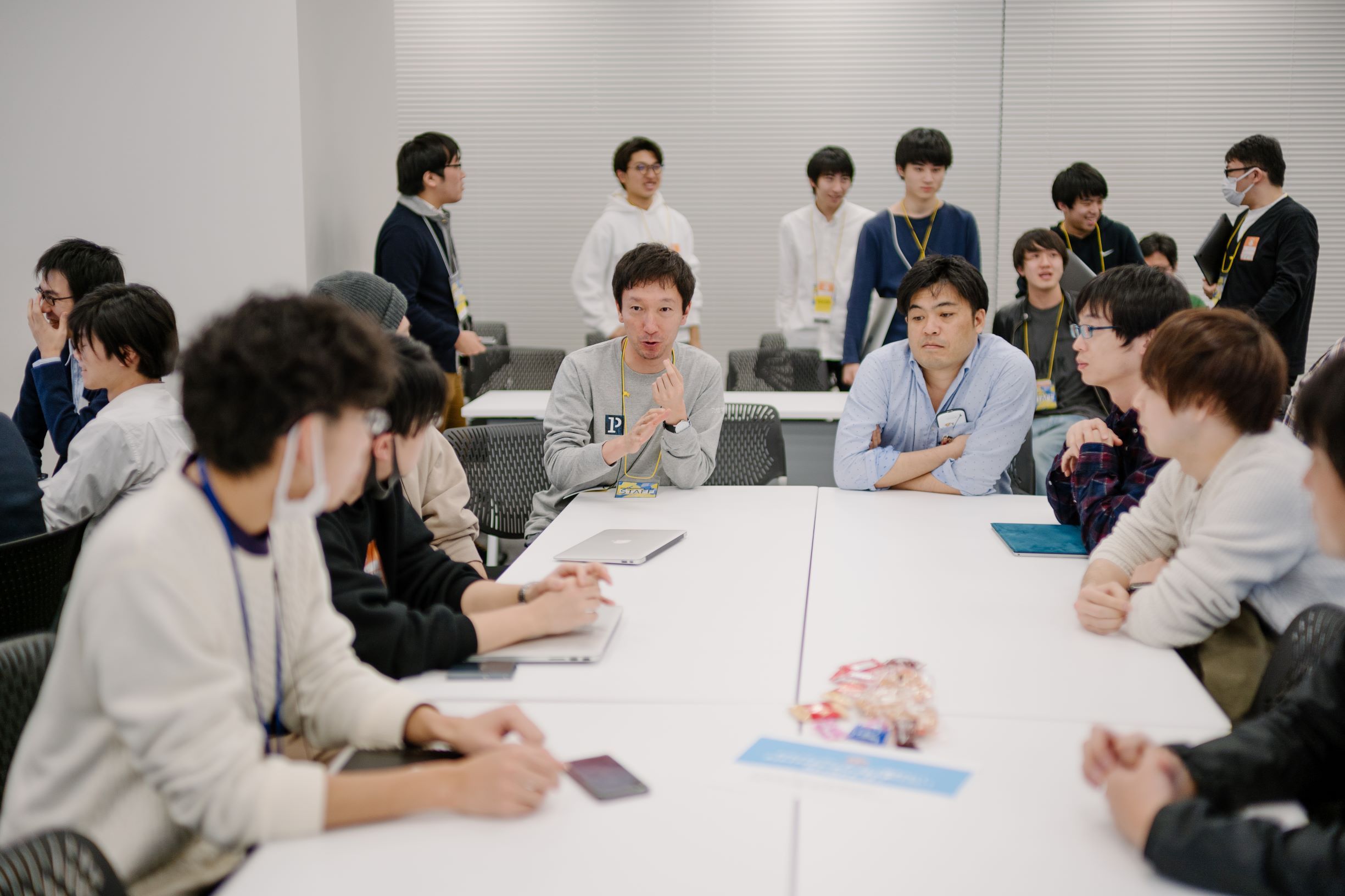 “consultation room” round table
“consultation room” round table
I enjoyed community building aspect while organizing the second PCD in Tokyo. During the first PCD, I wanted to give a more technical talk or to lead a workshop, but because of lack of time I worked mostly behind the scene to make a welcoming space for all. There, I learned that I do not necessarily have to present my work to others as my field is niche - around neurodiversity and adapding algorithmic methods to other medium. Rather, what I can bring to the community in Japan is my experience abroad, for example, the participation in the first PCD in Boston before they started worldwide and also at a week-long intensive workshop at School for Poetic Computation. Based on these experiences, I started building a community in Tokyo from scratch which does not belong to any existing institutions. I am glad to see the emerging color of PCD Tokyo. With takawo, Reona and Chinyuri, we created a cover image with p5.js, and our style is different from that of the video jockey scene, for example. It does not mean PCD should follow a specific style, but what I mean is that we are creating our own value and aesthetics. Furthermore, we are rebranding Processing from the image related to beginners’ programming language while keeping the philosophy of helping each other.
At last, I would like to give credits to all the organizing members:
Organizers
- mao tada
- hasegawa
- Reona
- takawo
- Nori-san
- ayakooo
- Chinyuri
- Shu Ogawa
- Ayato
- Niinomi
- Yasuto Nakanishi
- Ayumu Nagamatsu
Live streaming and photos
Keynote
Workshop leaders
Volunteers on site
- Masaya Nakazato
- JunKiyoshi
- okuyama
- Kyabe
- yuki hikita
- Yuz
- eddy
- Taito Otani
- TaniHaru
- koroyu
- kosaku namikawa
- ritoco
- Santa
All the photos (except Twitter embeds) in this article are taken by Shion Fukushima. And special thanks to deconbatch, who actively posted PCD-related sketches on twitter.
Processing Community Day Tokyo 2020 いよいよ開催!😀
— deconbatch (@deconbatch) January 31, 2020
いよ開ですよ!! いよ開!😆
隅から隅まで見逃さないぞ〜🔬https://t.co/fzvcSCPi8D#Processing #PCD2020 #creativecoding pic.twitter.com/0cPhgfVrgk
Here are the reports and slides from the presenters (in Japanese).
- WGG
- Taito Otani
- @moxus
- takawo
- Hau-kun
- nasana
- Niinomi
- Atsushi Tadokoro
- Reona
- Tatsuki Hayama
- FAL
- aadebdeb / Atsushi Asakura
#PCD2020 トークセッションを聞きながら。#まっちゃねこ #作字 #processing pic.twitter.com/7ZAwUrYuTN
— ちにゅり (@chinyuri_6v6) February 1, 2020
A cute sketch from Chinyuri
